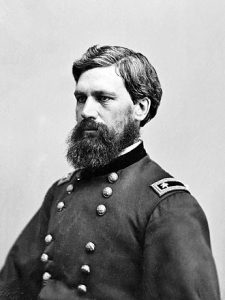Union 11th Corps Commander Major General Oliver Otis Howard pushed into Gettysburg on the 1st of July, thrown into the chaos that was the first stages of the battle. He was bewildered, not knowing just exactly where the Union troops were, and he certainly had no idea of the enemy situation. John Reynolds, the man previously in command the field had just fallen, and Howard by rank and by right, took over.
As a military man, I do have sympathy for his predicament, he was thrust into this crucible of chaos without any sort of situation briefing or continuity, and with only his own senses to rely on. Howard, a good soldier but not a great military mind, did hear the sounds of battle and see the smoke, all of it to the North and West of the town of Gettysburg. He may not have known what exactly was happening there, but it was at least clear that is where everything was going on.
He ordered his commanders into the battle to the north and west, except one. Howard took notice of a small rocky hill south and east of Gettysburg, and at this place, which was well away from the fight, he posted a Brigade of men under the command of Orland Smith. Colonel Smith was not a professional soldier, rather a businessman made colonel because of political connections, although was competent enough, and he did understand orders. Howard told Colonel Smith to hold Cemetery Hill to the last man, which must have sounded strange to Smith, as it was so far away from the battle.
It turned out to be likely the most inspired thing that O.O. Howard did during his military career. The Confederates managed to defeat the force to the west and north, including Howard’s own in grand style. Many of Howard’s men were killed or captured, and others went missing only to appear after the battle. At this moment, there was only one obstacle between the Confederate Army and the field at Gettysburg, which would have given them afterwards a clear road to Washington, and then likely the war: Colonel Orland Smith on Cemetery Hill.
This space and the hill adjacent is the ground that the Union Army gathered on, and disorganized and dispirited as they were, managed to hold onto it for the remainder of the battle. Despite several all out Confederate efforts to possess this key ground, and while enduring thousands of dead and wounded the enemy Army never did.
There are several morals to the story, the primary of which is the value of the high ground. So placed on the high ground, one is looking down at his problem, while his opponent is looking up, the power balance being with the one highest. Ground occupied, that is defensible and generates an advantage is absolutely key- and a good soldier knows that there is no glory in fighting soldiers at a place where there is no prospect of victory. To attack a adversary so posted is not advisable.
This is the cardinal sin of a General to throw his troops away for no reason, to be so obtuse to know that he is beaten and still commit, to choose a hill to attack and die upon for no gain at all. It is better at this point to stop and think, choose discretion as the greater portion of valor and simply hold what he has. Even retreat, a total concession of a fight that cannot possibly be won, is more desirable. Vanity is the enemy of the commander, and it was vanity that killed those soldiers in grey that tried to take Cemetery and Culp’s hills. Strength of position, and the advantages that such strength generates, is an important metaphor towards personal security.
The High Ground is physical, surely- but also mental and more importantly moral. Defending the right thing and committing to its defense regardless of the hardship that must be endured afterwards becomes the watchword of not only those engaged in their own defense, but an expectation and responsibility of every American citizen.
I would think the main challenge in finding the mental high ground is simply understanding where it can be located. Located in the security sense, as in if something bad happens it is my intention to post myself upon X space, where with my tools of the trade I know I have a tremendous physical advantage. Otherwise, developed and deep personal thought and study on a topic only informs the belief system, and belief system could be totally incorrect in view of the facts. So, the mental high ground must be expertise in a subject with explanation, while allowing for beliefs, and understanding that this knowledge is still at best circumstantial.
The mental high ground is also a commitment, to know as much as possible prior to being placed into a physical situation. This means that one must train himself to be at the very least adequate, and even though possibly dispirited and mentally scattered during a moment of crisis, has at lest anticipated and makes himself ready for the situation. Training, even if it as simple as thinking a possibility through, becomes a matter of strategic importance.
The moral high ground is something else entirely, and should not only be disconnected from beliefs, but in a sense disconnected from mental expertise. Moral high ground is also a commitment, and really nothing more in…..well…..my belief. The best piece of military advice that I have ever gotten was from my father, who said, “The right thing, and the smart thing, are always the same thing.” It is right to be honest, consistent, and act in good faith. Likewise so to be a practitioner of the golden rule. In the security sense, relationships matter, and those that are offended are more likely to count you as an enemy, and enemies are more likely to fight with one another.
The main moral imperative in the security sense is that you have a moral obligation to fight, if survival is in question. Likewise, it is a moral imperative to be a protector of those that you are responsible for, the primary of which is your family, but also anyone else that you have taken an oath to defend. For the military and policeman, this is a fairly obvious field, that really includes everyone in the country or community. For the private citizen, it could begin and end with family and self.
We should go forward, with the mental acuity to be able to determine exactly where this high ground is located and what to do when upon it, the moral courage to commit to defending it as an imperative, and the physical strength to succeed against threat actors which wish to possess it. Regardless of the cost, and so articulated we must HOLD THE HIGH GROUND!


